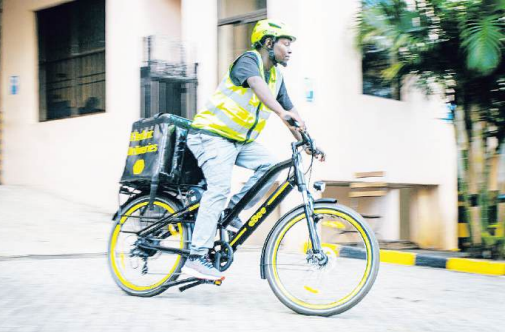
In the streets of Nairobi, and other major towns bicycles are increasingly becoming a common sight as delivery riders weave through traffic with packages strapped to their backs.
What has in recent years been a market dominated by motorcycles is now seeing a shift as businesses and riders embrace bicycles as a cost-effective, eco-friendly alternative.
The thriving gig economy is offering lifeline to the bicycle business which at one time has seen their obituaries already written.
On 14 February, The Star struggled to secure an interview with the bicycle delivery people around town. Probably it was during the valentines and it was not the right time as couples exchanged gifts.
After a while, we got hold of Duncan Okoth one such rider, along Kimathi Street, who is focused on last-mile deliveries and daily commutes around the central Business District and neighbouring estates.
“This is what I do, didn’t have much money to acquire a car for taxi but it was just enough to get me a bicycle and since I have a smartphone, it is just a matter of registrations and then wait for request,” Okoth said.
Like many other cyclers who have graduated from different institutions, the difficulty to secure employment has been the driving factor.
Peter Mwangi, a delivery rider in Nairobi who ply’s his trade using electric bicycle also says that since he completed the acquisition of the bicycle through a buy-now-pay-later plan, it has offered a lifeline for him and his young family.
He paid an initial deposit of Sh10,000 and then a daily Sh250 until he completed the payments over a one year period, a the bike that has an average market price of Sh76,000 on the buy-now-pay-later module.
“For short-distance deliveries, bicycles make perfect sense. I don’t have to worry about fuel prices, and I get to keep more of my earnings,” Mwangi said.
For many, the purchase and maintenance cost is a factor, partly because e-bicycles don’t consume fuel and have low maintenance costs when compared to ordinary motorcycles.
The trend is gaining traction in other major cities like Mombasa and Kisumu, where rising fuel costs, congestion and environmental concerns are pushing both businesses and independent couriers to explore non-motorised transport. From food deliveries to e-commerce parcels, bicycles are proving to be a viable solution in Kenya’s evolving urban logistics sector.
URBAN LOGISTICS SECTOR
Mwangi, who hails from Kasarani said on a good day, he is able to make up to Sh2,000. Several factors are fueling this shift.
One of the biggest is cost savings according to industry players. Unlike motorcycles, bicycles require no fuel, minimal maintenance and lower purchase costs, making them an attractive option for small-scale couriers and startups looking to cut operational expenses.
John Ndiritu a gas delivery rider in Embakasi however says that despite their advantages, bicycle couriers face significant challenges.
Poor road infrastructure, lack of dedicated cycling lanes and road safety concerns remain major hurdles.
“Kenya’s urban roads are primarily designed for motor vehicles, leaving cyclists to navigate high-risk environments,” he said.
Despite no official figures from dealers, a spot check across bicycle selling points in Nairobi revealed that there has been increased sales. Duke Makini who sells the ex-UK bicycles in Eastland’s said initially, the market was mainly for children bicycles but there has been notable growth in sales for larger bicycles.
“The Ex UK are sold from Sh8,000 to Sh25,000 with the prices determined by size and durability in the market,” said Makini However, Nairobi’s unpredictable rains and the intense heat in coastal cities like Mombasa can make bicycle deliveries physically demanding, with companies exploring solutions such as waterproof gear and electric-assist bicycles to improve rider comfort and efficiency.
Several delivery startups and established businesses are integrating bicycles into their logistics operations.
Companies like Glovo and Uber Eats have started onboarding bicycle couriers to expand their fleet while reducing costs. Some local businesses, particularly in the food and retail sectors, are also adopting bicycle deliveries as a way to enhance their sustainability efforts.
Kenya’s bicycle market is poised for steady expansion according to markets intelligence firm Statista, with revenue expected to reach $15.42 million (Sh2 billion) in 2025.
Over the next four years, the market is forecasted to grow at a compound annual growth rate (CAGR) of 3.03 per cent, bringing total revenue to $17.38 million (Sh2.25 billion) by 2029.
Unit sales in the sector are projected to climb, reaching 87,970 bicycles by 2029. Meanwhile, the volume-weighted average price per bicycle in 2025 is anticipated to be around $163.59 (Sh21,168 ).
On a global scale, China is set to dominate the industry, generating the highest revenue of $12 billion (Sh1.55 trillion) in 2025.
The sustained growth in the bicycle market aligns with increasing
demand for eco-friendly transportation, rising health consciousness, and
government initiatives promoting
cycling infrastructure.









